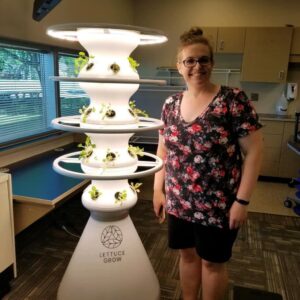Final report for YENC23-197
Project Information
Farm Camp on Wheels will teach youth in summer school and Boys and Girls Club Programs about sustainable agriculture and environmental stewardship on a weekly basis from early June to mid-August 2023 through the following methods:
- Use of Hydroponic Gardens in the classrooms - sampling and cooking
- STEM Projects revolving around the environment - including but not limited to: worms, bug larvae, composting
- One field day at Harvest Hope Farm to meet and learn about the animals, visit the pollinator garden and see the larger gardens in progress
- Forestry, food service and farming speakers for each classroom.
Summary: This project served 126 youth from early June through mid-August at three summer programs. Youth were ages 3-12 years old. Each of the three programs had a hydroponic garden that exposed youth to growing and greens. Additionally the following items were taught throughout the summer:
- Bean plant project. What do you need to grow a plant.
- Cloud project: Importance of water
- Fleece and Fiber Demonstration: Why are fleece and fiber important and where do they come from.
- Animal visits: Llamas, chickens and lambs visited the classrooms to teach about food sources, fiber sources and transportation of animals.
- Composting: how to be good stewards to our environment
- Field Day on the Farm: Exposure to gardens, animals and a farm way of life.
- Pollinators: Why are bees and butterflies important for growing
- Insects and worm: how do these affect our soil.
Our approach was all hands-on. The kids loved learning hands on. From playing with wool, learning how to finger knit, petting the animals and making clouds, every session involved hands-on learning. Learning was interactive and fun. The youth involved in each program saw an increase in learning in an area that they are rarely exposed to. 81% of youth indicated an increase in awareness or learning during this summer program.
We conclude that Farm Camp on Wheels was a success in the summer school programs that we worked in and that youth should be exposed to agriculture practices in the classroom year around. We are excited to say that we will be working in two of the three programs that we worked with this summer throughout the 2023-2024 school year within the classroom. Learning at it's finest, hands-on and real life.
- Educate 100 youth about the importance of sustainable food practices and environmental stewardship through the use of hydroponic gardens and a field day at Harvest Hope Farm.
- Educate 15 preschool youth and their parents about the importance of exposing youth, at young ages, to healthy eating practices and how this can influence food choices as they grow up. One preschool will be given a hydroponic garden to use for summer 2023 in an effort to teach youth and families that you can grow a garden anywhere.
- Introduce youth to sustainable agriculture careers through guest speakers from various agriculture and food related careers during the field day at Harvest Hope Farm.
Cooperators
- (Educator)
- (Researcher)
- (Educator and Researcher)
Educational & Outreach Activities
Participation summary:
Farm Camp on Wheels was hosted at three sites throughout summer 2023. During this time we presented at one site 7 times and the two additional sites 5 times each. Additionally, each group site was able to visit the farm for an on-site farm tour. Total, 100 youth were served between the three sites. Educators at each school site joined for all activities including the farm tour. During the farm tour, youth and adults were able to expand their learning from the Farm Camp on Wheels presentations. On site farm education/tour included the following: chicken tractor demonstration, garden tour, barn tour to include pigs, lambs, llamas, calf, chickens, goats and a donkey. Youth were able to bottle feed the calf and feed other animals as well as collect eggs and learn about where their food comes from.
Farm Camp on Wheels presentations included the following: Weather impacts, fleece/wool demonstration, hydroponic gardens, why eat veggies, interaction with llamas, lambs and chickens (hands-on), why veggies matter, composting, pollinators and growing bean plants.
Harvest Hope Farm newsletters and Facebook posts shared frequent information regarding Farm Camp on Wheels.
Learning Outcomes
Animal Knowledge
Composting (kitchen scraps for garden compost)
Fleece and fiber
Why worms and bugs are important
Rain vs. drought vs. dry weather
Pollinators - why are they important
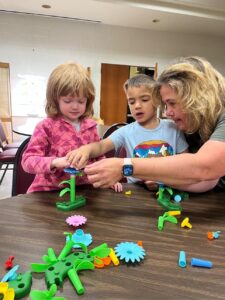
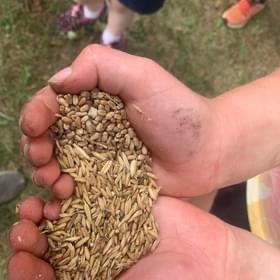
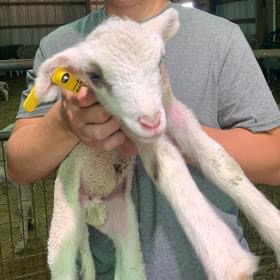
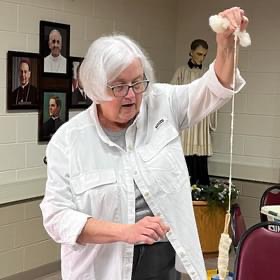
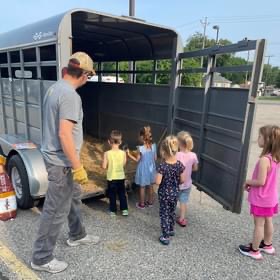 Throughout the weeks of Farm Camp on Wheels, youth were exposed to various activities that are used in our traditional Farm Camp at Harvest Hope Farm. Due to time constraints, these activities were modified to meet the time frame and number of youth present at each Farm Camp on Wheels session.
Throughout the weeks of Farm Camp on Wheels, youth were exposed to various activities that are used in our traditional Farm Camp at Harvest Hope Farm. Due to time constraints, these activities were modified to meet the time frame and number of youth present at each Farm Camp on Wheels session.
Small group sessions, 8 - 20, received more hands-on learning while the larger groups, 25+, received a more general demonstration for each area.
All youth learned about the following, modified by age and group size:
- Importance of farm animals and where our food comes from.
- Composting; saving your kitchen scraps from the garbage dump
- Fleece and fiber; how are they used in our world? Why is shearing important?
- Worms, bugs and soil, how do they work together to make gardens grow.
- Cloud activity; making clouds with water, shaving cream and food coloring
- Butterflies and bees, why do they need them (and how to keep from getting stung)
Nearly all of the youth participating in our Farm Camp on Wheels program reported an increase in learning and awareness. When you work with kids ages 3-12 there is going to be a difference in learning and in some cases the younger kids were clearly more interested than the older kids. It should also be noted that in one program, Boys and Girls Club, some of the older kids clearly did not want to be in the program all together as it was over all geared toward younger kids and was somewhat of a "daycare" summer program setting. That being said, there were four 12 year olds in that specific program, two boys and two girls, that were very intrigued by the learning that was taking place. They shared about their own ideas of knitting and were very interested in learning more about where wool and fiber come from. This was a huge success for this program in working with kids that age.
Nearly 75% of the youth participating in Farm Camp on Wheels were ages 3-10. This group was the most vibrant and excited to learn.
Photos with youth above are from the preschool program at Holy Spirit as this is the only program that was able to provide us with photo releases for youth.
Project Outcomes
Teaching about sustainable agriculture is at the heart of our organization's mission. This grant allowed us to show further to our board and our volunteers the importance of our mission and to go after larger grants to support our mission.
Several parents and teachers who visited the farm or learned about our program have indicated that they will consider planting gardens with their youth as well as composting.
As stated above there were four youth, all age 12, that had an amazing interest in the activities we presented during Farm Camp on Wheels. These kids were the oldest youth served and unlike many of their peers who were "just doing their time while mom and dad were at work" these four youth used these sessions to expand and grow their knowledge. All four demonstrated a great interest in knitting and learning more about fleece and wool. They all participate fully in the activities each week. They all took an unassigned role in looking after the hydroponic gardens and they all expressed interest in future careers in agriculture. (Youth from Boys and Girls Club Program - North Dakota).
This grant program has truly made our work more accessible to youth within the community that otherwise would not be able to participate in our programs. It has helped us to break down financial and transportation barriers that currently seem to be a huge problem for many families with children. Thank you for allowing us the opportunity to bring our Farm to the Youth!
